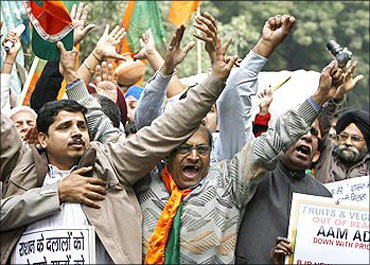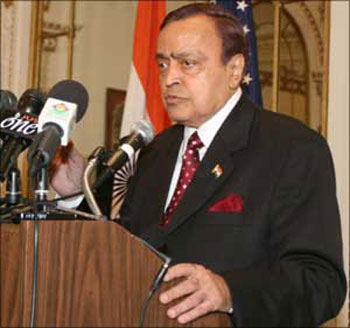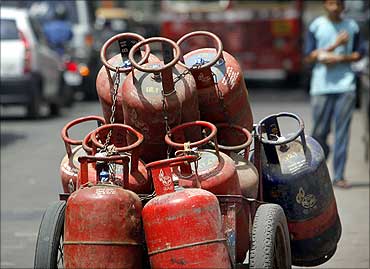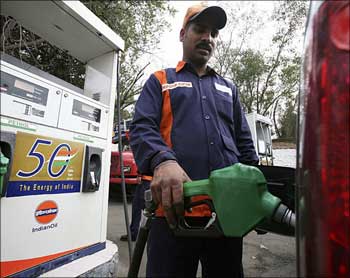 | « Back to article | Print this article |
Fuel price hike is justified, says Deora; slams Oppn
With Opposition parties calling for a nationwide strike against the hike in fuel prices, Petroleum Minister Murli Deora on Wednesday justified the decision, saying the increase translated to less than Re 1 per day on domestic LPG and 26-27 paisa a day on kerosene.
"No benefit will accrue with this kind of adventurism. We want people and Opposition parties to understand the compulsions under which we took this decision and what impact it will have on people," Deora said.
Describing claims made by critics of the June 25 decision as 'exaggeration', he said the Rs 35 increase in the price of LPG cylinders translated into an additional burden of less than a rupee per day, considering a bottle of domestic gas lasts 30-35 days.
The Rs 3 a litre hike in kerosene translated into an additional burden of 26-27 paisa per day.
"We have kept the burden on the poor man the minimal. The talk of the hike breaking the back of the poor and common man is nothing but exaggeration. The facts are before you," he said.
The Bharatiya Janata Party and and Left parties have separately given a call for a nationwide strike on July 5 against the fuel price hike.
Click NEXT to read on . . .
Fuel price hike is justified, says Deora; slams Oppn
Deora refused to answer questions on a rollback, saying, "I do not know anything (on that)."
Alongside the hike in LPG and kerosene rates, the prices of petrol were freed from government control, leading to an increase in the rates by Rs 3.50 per litre in Delhi from June 26. Diesel prices were also deregulated, but the rates increased by Rs 2 per litre only, in preparation for an eventual freeing of prices.
"The National Democratic Alliance government raised price of PDS (public distribution system) kerosene from Rs 2.52 per litre in January, 1998, to Rs 9 per litre in March, 2002. This hike was 258 per cent, even though crude oil prices rose by just 147 per cent during the period," he said.
The Congress-led United Progressive Alliance government did not increase kerosene prices for the past six years, despite the price of crude oil (the raw material for making petrol, diesel, domestic LPG and kerosene) more than doubling from $36 a barrel in May, 2004, to $78 currently.
"We raised kerosene rates by Rs 3 per litre against the required increase of Rs 18.07 per litre," he said. "We have ensured that the poor are not unnecessarily burdened."
"We will continue to subsidise LPG and kerosene, which are the common man's cooking fuels. Even after last week's price increase, kerosene price is Rs 15.07 per litre below cost and LPG is under-priced by Rs 226.90 per cylinder," he said.
Click NEXT to read on . . .
Fuel price hike is justified, says Deora; slams Oppn
The United Front government, of which the Left parties, Telugu Desam Party and Samajwadi Party were constituents, in November, 1997, notified full deregulation of the prices of petrol, diesel, LPG and kerosene by 2002.
According to this schedule, the rates of kerosene and LPG should have been at least double the revised price of Rs 12.32 per litre and Rs 345.35 per cylinder, respectively.
Deora said Prime Minister Manmohan Singh had stated on Tuesday that the government had taken care that the poorest sections of society are not impacted and so, kerosene and LPG prices would continue to be regulated.
"We want support of the people and the Opposition (on the issue of fuel price hike)," he said. "The increase in kerosene price will also help stop adulteration and diversion of PDS kerosene to open market."
The pre-hike price of Rs 9.32 per litre made kerosene lucrative for adulteration in fuels like diesel as also diversion in open market.
Click NEXT to read on . . .
Fuel price hike is justified, says Deora; slams Oppn
The NDA government, he said, had in April, 2002, freed petrol and diesel prices from government control, with the rates being revised twice a month based on international prices.
"We have freed price of petrol, a fuel that is used in cars. Diesel prices will be eventually freed, but the government reserves the right to intervene in case of sharp spike or excessive volatility in global prices," he said.
"What we did was bare necessity. We were compelled to do so because oil PSUs were faced with Rs 74,300 crore (Rs 743 billion) under recoveries (revenue loss on fuel sales this fiscal)," he said.
"The Opposition is being a hypocrite in its criticism." Even after the hike, oil PSUs would be saddled with Rs 53,000 crore (Rs 530 billion) of under-recoveries.
"Petrol price has increased only 53 per cent and diesel 85 per cent since May, 2004, despite crude oil prices rising by 111 per cent," he said.



